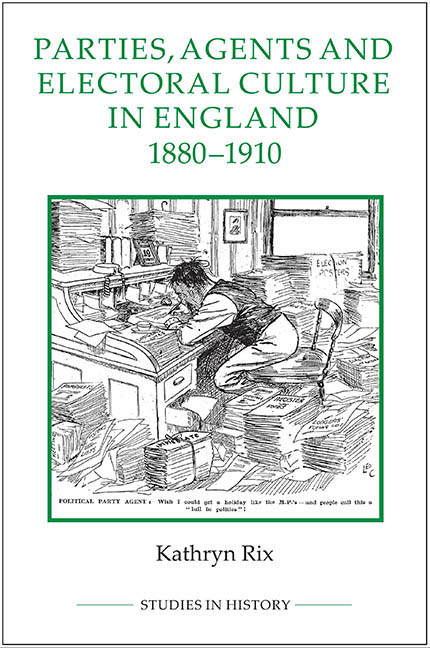Book contents
- Frontmatter
- Dedication
- Contents
- Tables
- Acknowledgements
- Abbreviations
- Introduction
- 1 The changing electoral system
- 2 The rise of the professional agent
- 3 The agents as aspiring professionals
- 4 The agents in the constituencies: registration and political education
- 5 The Agents in the Constituencies: The Social Side of Politics
- 6 Electioneering: the candidates
- 7 Electioneering: the campaign
- Conclusion
- Bibliography
- Index
3 - The agents as aspiring professionals
Published online by Cambridge University Press: 13 April 2017
- Frontmatter
- Dedication
- Contents
- Tables
- Acknowledgements
- Abbreviations
- Introduction
- 1 The changing electoral system
- 2 The rise of the professional agent
- 3 The agents as aspiring professionals
- 4 The agents in the constituencies: registration and political education
- 5 The Agents in the Constituencies: The Social Side of Politics
- 6 Electioneering: the candidates
- 7 Electioneering: the campaign
- Conclusion
- Bibliography
- Index
Summary
Addressing fellow members of the Northern Association of Conservative Agents in 1902, George Hunter reflected that ‘twenty or thirty years ago … the Conservative agents were simply worn-out men. Now … they constituted a profession. They had their society and their examinations.’ The establishment of national agents’ associations by the Liberals in 1882 and 1893 and by the Conservatives in 1891 can be viewed as part of the general expansion of party organisation during this period. However, they also reflected another organisational trend: the foundation of professional bodies by occupational groups ranging from accountants to veterinary surgeons, a process which saw rapid expansion after 1880. The agents need to be understood as both political activists and aspiring professionals, for whom questions of professional status were a persistent concern. In analysing how far the agents’ efforts to become a profession were successful, this chapter will also shed light on the dynamics of party organisation, in particular the relationship between central and local bodies, and consider the impact which the emergence of the professional agents’ network had on methods of political work in the constituencies.
While the professions during the eighteenth and early nineteenth centuries centred on the core ‘liberal professions’ of the Church, medicine and law, the second half of the nineteenth century saw a marked expansion of the professional classes, stimulated by the diversification of Britain's industrial economy, particularly the enlarged service sector. Other factors encouraging the growth of the professions included the expansion of local government, continuing urbanisation, improved educational provision, and the development of professional management as businesses became increasingly complex. The census definition of a profession widened and the numbers listed on the census as engaged in professional activity more than doubled between 1861 and 1901, from 345,000 to 735,000. The number of professional organisations increased correspondingly. In 1800 there were just seven qualifying associations (organisations controlling entry to their profession); this rose to twenty-seven by 1880, forty-eight by 1900 and seventy-five by 1918.The last three decades of the nineteenth century saw long-established bodies such as the Royal College of Physicians (1518) and the Law Society (1739) joined by groups including librarians (1877), dentists (1880), accountants (1880), patent agents (1882) and secretaries (1891).
- Type
- Chapter
- Information
- Parties, Agents and Electoral Culture in England, 1880-1910 , pp. 87 - 122Publisher: Boydell & BrewerPrint publication year: 2016



